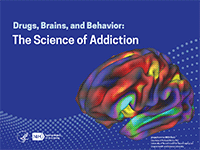Science of Addiction
Located in the brain is the reward center which includes structures that control and regulate our ability to feel pleasure. When we eat food, listen to music, exercise, fall in love, or other pleasurable activities, the reward center is activated. Our brain remembers things associated with this experience and motivates us to repeat these behaviors.
However, drugs are able hijack this process. When a person takes certain drugs, the reward center is overwhelmed and the brain attempts to regulate this surge. As a result, after the initial rush, the brain’s reward center returns to a level even lower than before. With repeated drug use, the person needs more and more of the drug just to feel good [tolerance].
Over time, if drug use continues, other pleasurable activities become less pleasurable, and the person has to take the drug to feel “normal.” Eventually, the person needs the drug just to avoid feeling sick, anxious, or depressed.
So why do people start using drugs? There are a variety of reasons. Many people began with a legitimate prescription for pain. Research shows that opioids are highly addictive and people can become addicted after just a few days. Other people may take drugs to alleviate anxiety, stress, or depression. Still others may try drugs out of curiosity or social pressure.
Regardless of why people start using drugs, with continued use, a person’s ability to exert self-control can become seriously impaired. Brain imaging studies from people addicted to drugs show physical changes in areas of the brain that are critical for judgment, decision-making, learning, memory, and behavior control. Scientists believe that these changes alter the way the brain works and may help explain the compulsive and destructive behaviors of a person who becomes addicted. Long term use alters brain chemistry and function.
Addiction (severe substance use disorder) is defined as a chronic, relapsing disorder characterized by compulsive drug seeking and use despite adverse consequences. It is considered a brain disorder because it involves functional changes to the brain circuits involved in reward, stress, and self-control and those changes may last a long time after a person has stopped taking drugs.

Source: National Institute on Drug Abuse; National Institutes of Health; U.S. Department of Health and Human Services. (2018, July 20). Drugs, Brains, and Behavior: The Science of Addiction. https://www.drugabuse.gov/publications/drugs-brains-behavior-science-addiction